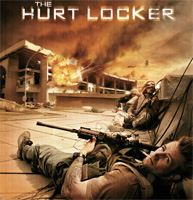 I am not a movie buff by any standard, but somehow I suspect I am not the only one who was more than a little surprised at the reception of the latest war movie at Sunday's Oscars. The voice of the veteran community has pretty unanimously denounced it as not only inaccurate, but a dangerous misrepresentation of the reality of war. I would agree with that appraisal.
I am not a movie buff by any standard, but somehow I suspect I am not the only one who was more than a little surprised at the reception of the latest war movie at Sunday's Oscars. The voice of the veteran community has pretty unanimously denounced it as not only inaccurate, but a dangerous misrepresentation of the reality of war. I would agree with that appraisal.
A hurt locker, if we are to subscribe to the movie's use of the term, is where one stores the things that nearly kill them. Maybe yours is under your bed, or maybe you left it in the refrigerator by accident. For most service members, theirs is tucked away securely where nobody can get to it, where it is thought that nothing can get in or out. Their locker is an emotional defense against a world that rarely understands them and (if I am to judge based on the storyline of the movie) cheapens their experiences in attempting to market it to a mass audience.
What happens when our hurt lockers aren't big enough for what we need to jam in there? We had all kinds of training in boot camp how to pack efficiently, so I know we have put everything in there that we possibly can. Maybe that explains last year's epidemic of soldier suicides that have surpassed any year we have on record. I wish it were as easy as stuffing something in a box and shoving it somewhere out of sight. Or watching some glib movie.
It is a bit disconcerting to realize that the quotation the movie opens with is taken from Christopher Hedges' book War Is a Force that Gives Us Meaning. Mr. Hedges will speak as an expert witness at the upcoming Truth Commission on Conscience in War. Alongside him, I and four other Iraq veterans will be testifying on the issue of conscience in war and the unalienable human right to moral freedom.
Very few service members would agree with the premise that war is a good thing, which seems to be the main character's operating principle in The Hurt Locker. If war is in fact hell, how do we keep from overloading the troops with hurt locker material by sending them repeatedly to combat in wars they may find contradictory to their moral character? If you want to support the troops, you begin by listening to them.
On March 21, 2010, come to the Riverside Church in New York City to hear what we have to say. If you can't make it, follow Centurion's Guild on Twitter as we describe the testimony live as it unfolds. Then, from March 23 to Martinmas (November 11th) the commission will be considering our testimony and could use your support in raising this important issue to the level of national discourse. Nobody's hurt locker should have the last word. Commit today to our men and women in uniform serving in your place that you will help make this the year of conscience.
 Logan Laituri is an Army veteran with combatant service in Iraq during OIF II and experience with Christian Peacemaker Teams in Israel and the West Bank. He blogs sporadically and is a co-founder of Centurion's Guild.
Logan Laituri is an Army veteran with combatant service in Iraq during OIF II and experience with Christian Peacemaker Teams in Israel and the West Bank. He blogs sporadically and is a co-founder of Centurion's Guild.
Got something to say about what you're reading? We value your feedback!